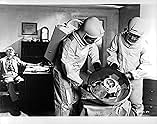Top scientists work feverishly in a secret, state-of-the-art laboratory to discover what killed the citizens of a small town and how the deadly contagion can be stopped.Top scientists work feverishly in a secret, state-of-the-art laboratory to discover what killed the citizens of a small town and how the deadly contagion can be stopped.Top scientists work feverishly in a secret, state-of-the-art laboratory to discover what killed the citizens of a small town and how the deadly contagion can be stopped.
- Nominated for 2 Oscars
- 4 nominations total
Joe Di Reda
- Wildfire Computer Sgt. Burk
- (as Joe DiReda)
- Director
- Writers
- All cast & crew
- Production, box office & more at IMDbPro
Storyline
Did you know
- TriviaSpecial effects to create the germ from space cost $250,000.
- GoofsAt the beginning of the movie, vultures are shown circling over the town of Piedmont. Later, when the two scientists approach the town in a helicopter, the vultures are on the ground eating the flesh of the dead. The military even brought gas to kill off the vultures so they wouldn't fly off and spread the disease. What's interesting, is that no one gives a second thought as to why the vultures weren't dead. Even after they kill off a rat and monkey in the lab to test the disease no one wonders how it was that the vultures weren't affected. It is not unusual, in fact rather typical, for pathogens or chemicals to affect some species and not others, or at least affect them more slowly.
- Quotes
[finding a man dead by self-inflicted drowning in a bathtub]
Dr. Jeremy Stone: I wouldn't believe you could commit suicide that way.
Dr. Mark Hall: Most of them died instantly, but a few had time to go quietly nuts.
- Crazy creditsThe opening credits read: "ACKNOWLEDGEMENTS This film concerns the four-day history of a major American scientific crisis. We received the generous help of many people attached to Project Scoop at Vandenberg Air Force Base and the Wildfire Laboratory in Flatrock, Nevada. They encouraged us to tell the story accurately and in detail." "The documents presented here are soon to be made public. They do not in any way jeopardize the national security."
- Alternate versionsItalian version is 10 minutes shorter than original version (released at 130 min.) and omits many scenes from a subplot about a fallen fighter plane.
- ConnectionsEdited into The Six Million Dollar Man: Population: Zero (1974)
Featured review
OK. I'm reading these reviews and I keep seeing the same things. Its shows its age. What ? That's like saying the aircraft in a WWII movie show their age. Of course it shows its age - this was the 1970s. Did you expect to see Pentium 4s with DVD Drives? If thats you main criticism then the movie must be good.
It is good. Probably one of the most realistic and suspenseful movies of its kind ever made. Though PURSUIT was pretty good as well. Robert Wise does a very good job of building the story in a leisurely pace that keep you rivetted. I've seen the movie now about a dozen times and it still keeps me interested. Its not one of those movies where you can stop it and watch the remainder the next day. It has to watched in one sitting. I think the casting of ordinary Joes in the leads was very telling. This is a story about science not about characters.
It will be interesting to see what they will do with the remake. Obviously the story is still relevant today - maybe even more so then in the late 60s.
It is good. Probably one of the most realistic and suspenseful movies of its kind ever made. Though PURSUIT was pretty good as well. Robert Wise does a very good job of building the story in a leisurely pace that keep you rivetted. I've seen the movie now about a dozen times and it still keeps me interested. Its not one of those movies where you can stop it and watch the remainder the next day. It has to watched in one sitting. I think the casting of ordinary Joes in the leads was very telling. This is a story about science not about characters.
It will be interesting to see what they will do with the remake. Obviously the story is still relevant today - maybe even more so then in the late 60s.
Details
- Release date
- Country of origin
- Language
- Also known as
- Andromeda - Tödlicher Staub aus dem All
- Filming locations
- Production company
- See more company credits at IMDbPro
Box office
- Budget
- $6,500,000 (estimated)
- Gross worldwide
- $445
- Runtime2 hours 11 minutes
- Color
- Aspect ratio
- 2.39 : 1
Contribute to this page
Suggest an edit or add missing content








































